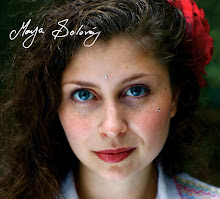To me, writing in other languages like Spanish and Portuguese, allows me to explore many different things musically. When I first began writing songs at the age of 15, they were extremely lyrical- more like musical poems if you will, since my backround was in poetry. As my musical breadth grew, I came to a place where it was not the lyrics that were my primary focus, but the music. That is why, when writing in Portuguese, I can focus more on the actual sounds, or music of the words, rather than be completely consumed with their meaning. (The meaning is of course, always important as well, but in this case, takes second rank). It can take more of a sparse, imagery driven poetic sense, without an epic story having to carry the load. Take for instance, the song "A Escultura" ("The Sculpture")
A ESCULTURA (Portugues)
Pegue a minha mao
Andamos atraves
Das estrellas de ouro
Escuridao gritando
Quando as maos
Esculpem o mundo.
Nada se escapa
Da boca do tempo
Nem o silencio
Escondido abaixo
Quando o coracao
Esculpe o mundo.
Devi Bhavani Ma Kali Bhavani Ma
Jaya Ma Jaya Jaya Ma Devi Bhavani Ma
As maos esculpem o mundo
O coracao esculpe o mundo.
A ESCULTURA (The Sculpture)
Take my hand
We’ll walk across
Stars of gold
Darkness screaming
While our hands
Sculpt the world.
Nothing escapes
the mouth of time
Or the silence
Hidden underneath
While our heart
Sculpts the world.
*Divine mother, Mother of the worlds
Destroyer of illusion, unutterable silent recognition.* (*Sanskrit Mantra*)
©2006 MayaSolovéy
to listen via myspace, click http://www.myspace.com/mayasolovey2
Here, a few images coupled with some prose is enough to give meaning to the song, but the real crux of it all, to me, is the sounds the words make.
The Latin languages in general hold an entirely different mindset and perspective than English. Different things work or don't work, depending on their lingual and cultural context. For instance, take this song, "Como Yo Lloro Po Ti" ("Like I Cry for You").
COMO YO LLORO POR TI
Pajaros no cantan
Como te amo
El sol no brilla
Como te amo
Y la noche no se calle
Como yo lloro por ti.
Montañas no se mantienen
Como te amo
Olas no se mueven
Como te amo
Y el silencio
No se calle
Como yo lloro por ti.
Otro mundo me llama
Pero no puedo oir
Otro tiempo me llama
Pero no puedo recordar...
La única vida que conozco
Es en la que te amo
La única agua que mata mi sed
Es el agua de mis lágrimas
Porque la única vida
Que conozco
Es en la que te amo
Es en la que te amo.
©2006 Maya Solovéy
COMO YO LLORO POR TI (Like I Cry for You)
Birds don’t sing
Like I love you
The sun doesn’t shine
Like I love you
And night does not fall
Like I cry for you.
Mountains don’t stand
Like I love you
Waves don’t move
Like I love you
And silence does not fall
Like I cry for you.
Another world calls me
But I cannot hear
Another time calls me
But I cannot remember.
The only life that I know
Is that in which I love you
The only water that quenches my thirst
Is the water of my tears
Because the only life that I know
Is that in which
I love you.
©2006 Maya Solovéy
to listen via myspace, click http://www.myspace.com/mayasolovey2
One can't really get away with lyrics like this in English. It sounds entirely melodramatic. But in the Spanish languge, literature, poetry and songs have been written in this vein for centuries. It's part of the cultural context, and it's also kind of just how the language works sometimes. English tends to be good for describing things, for nuance, for multiple meanings, puns, plays on words. The Latin languages tend to be more about emotion. They even have a different grammar called the Subjunctive for such things, as well as for things like the unknown possibility of something, would haves and could haves, and others.
Subscribe to:
Post Comments (Atom)





No comments:
Post a Comment